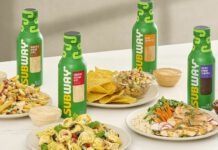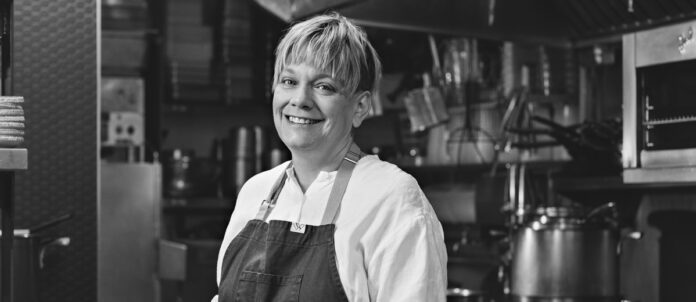By Suzanne Chin-Loy
With a name that’s synonymous with excellence in the culinary world, chef Andrea Carlson recently became the first female chef in Canada ever to receive a Michelin Star, shattering glass ceilings and setting a new standard of excellence in the industry. Her journey to success has been paved with hard work, perseverance, and a passion for creating extraordinary dining experiences. But if you ask her and her partner Kevin Bismanis what their goal was at Burdock & Co. in Vancouver, her answer would be that community has always been the heart and core of their mission.
“Our entire reason for being is that we want to be a part of the fabric of this food community,” says Carlson, Foodservice and Hospitality magazine’s Chef of the Year. “Part of the motivation for wanting to open Burdock was that we wanted to make a neighbourhood place where everyone could come and enjoy eating and supporting [our] local growers — we’re a part of this cycle of farm-to-table — and if there were no more organic farms, we wouldn’t [have Burdock].”
Burdock & Co. boasts a tasting menu that changes every one or two months based on the moon cycles. The September menu, “Submerging stones under the Surgeon Moon” ($125 per guest) will feature a root vegetable in each of its five courses.
“It’s super fun to use your creative templates and keep it changing all the time,” says Carlson. “So, the next [menu] could probably be based on the rice-drying moon. That happened in October and we’ll use rice from Massa Shiroki, a sake producer here in Vancouver and base some of the dishes on his rice.”
Carlson’s passion for gastronomy was ignited at a young age when she began seeking to connect sensory experiences of food with life experiences. For her, [experimenting with food] was “a warm place to be — it’s about the aromas, the visuals, the smelling and tasting, the three-dimensional” art of composing. Not wanting a career behind a desk, she applied to the Pierre Dubrulle Culinary School in Vancouver, studying traditional French culinary basics on a small scale, which she preferred over institutional cooking.
“I’ve had the great fortune of always landing in places that were very progressive and very modern,” says Carlson. She worked under chef Rob Clark, a pioneer of sustainable seafood and the first chef to adopt the Ocean Wise program, at C Restaurant in Vancouver. “After my time at C Restaurant, I joined Sinclair and Frederique Philip at Sooke Harbour House, where every cook on a station was responsible for creating a different menu daily,” Carlson adds.
During her time at Sooke Harbour House on Vancouver Island, Carlson was exposed to regional cuisine and dining, using the freshest ingredients, which reflected the natural world’s beauty and flavours. Carlson recalls, “At Sooke Harbour House, I drew inspiration from the fresh botanicals on the property’s tremendous, beautiful acreage. This passion project of art and food featured an ever-changing daily menu that connected with the community.”
Carlson’s invaluable experience of not being able to use any imported ingredients to create whole dishes led her to experiment with comparable substitutes, something she has carried over to Burdock & Co.
“Sooke Harbour House was a pivotal experience in the culinary exercise of doing five to seven whole dishes based on these ingredients around you,” she continues. “You couldn’t use any imported [ingredients]. So, [for example], with honey and sugar, the acidic elements came from two crispy begonias. Connecting to fresh products’ natural beauty and integrity was my ‘aha’ moment.”
Apart from Burdock & Co., Carlson has other ventures such as Harvest Community Foods, a Community-Supported Agriculture (CSA) grocery store, and Bargo (Gobo), the latest addition showcasing young chefs and sommeliers. Both Vancouver locations focus on using fresh, locally sourced ingredients within a 100-mile radius. By supporting local farmers, Carlson’s vision for food security is emphasized. “On one of the Gulf islands, my partner and I attended a workshop for social-minded businesses for Finding Your Mission Statement,” she says, “We met a woman who helped us identify that our whole reason for being is food security.”
Carlson highlights Harvest Community Foods’ significance in sustaining small, local, organic farm networks and fostering community connections. “We offer a CSA bag out of Harvest — but what’s different about what we’re doing is that we’re buying from all local farm networks throughout the season, and we’ll diversify and fill our bags with whatever is exciting that week.” This approach provides more flexibility and freedom from the typical CSA model for individuals and couples.
“We went from 40 bags every two weeks to 400 bags every week during the pandemic,” says the Michelin-star chef. “Because the markets had closed, the farmers suddenly had nowhere to sell their products, and the people still wanted access to local products — so having 400 CSA bags going out a week to the community greatly impacted everyone across the board — it shone the light on the essential things which sustained the businesses [and strengthened] the community and the bonds within, which goes back to the idea of food security.”
When asked about her most significant achievement, Carlson says, “While I’m delighted to have the Michelin acknowledgement, which has made a huge difference to our business, I believe my greatest accomplishment to date was getting through the pandemic. My partner Kevin, who calls himself the “invisible hand,” is my emotional support, working tirelessly behind the scenes. Despite all the struggles and challenges, we managed to keep the same staff — a dedicated group of people who show up daily with so much passion. [Burdock] wouldn’t be here,” she adds, “without open-minded people willing to share its story and ethos.”
Carlson explains that the name Burdock was chosen intentionally for its versatility and transformative quality. She notes, “While it is not particularly glamorous or attractive, wild-crafted Burdock is used in teas and herbal remedies, and cultivated Burdock is frequently used in stews and braises in Japanese and other Asian cultures. Despite its natural earthiness, Burdock also has a surprisingly light sweetness that makes it a beautiful plant.”
In discussing her aspirations, Carlson describes her business as evolving serendipitously and following a natural flow. “It’s not been a year since we’ve had the Michelin,” she admits. “One of the most common questions after we got the Michelin star from the media was: ‘What are you going to change or do differently now that you’ve got the Michelin star?’ My question is, why would we change? That’s always been our thing at Burdock. We’re walking on our own path toward a sustainable, happy life.”


















